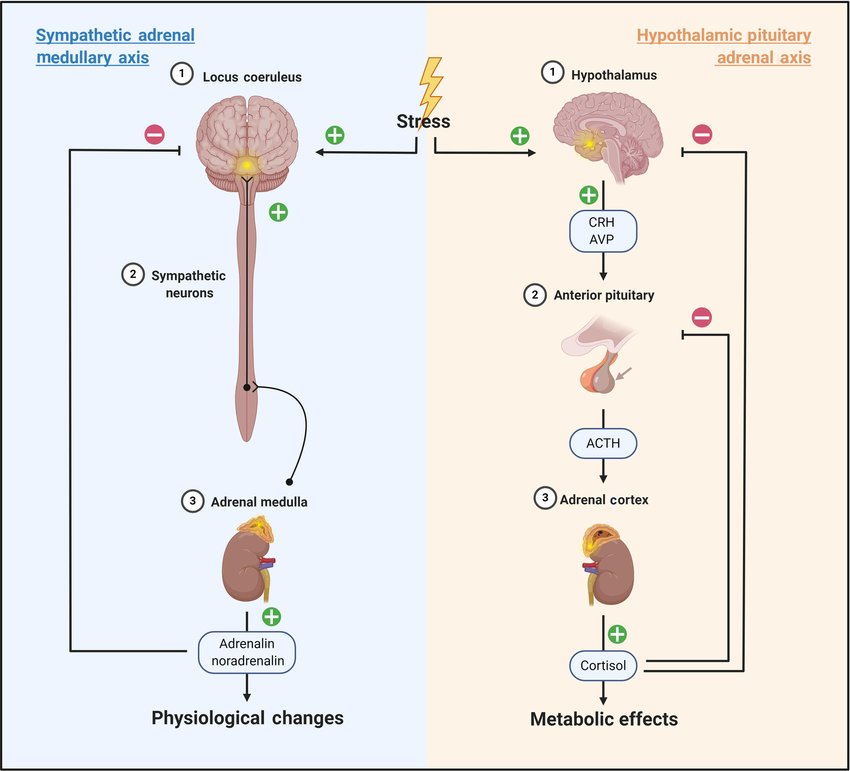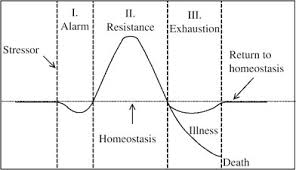Discuss one biological explanation of one health problem (22 marks)
1/15
Earn XP
Description and Tags
Heath psychology, stress, Newcomer et al, Joo et al, cortisol, GAS
Name | Mastery | Learn | Test | Matching | Spaced | Call with Kai |
|---|
No study sessions yet.
16 Terms
Biological effects of stress
The biological response to stress is activated by the sympathetic motor system and the adrenal cortical system. As a result of a stressor the sympathetic motor system releases epinephrine and adrenaline. This increases ventilation rate, heart rate, blood pressure, and blood sent to the muscles. It also decreases blood flow to the immune, digestive and reproductive systems. At the same time the hypothalamus causes the release of cortisol and other stress hormones from the adrenal cortex.

General adaptive syndrome model (GAS)
Hans Selye (1956) created this model to explain the biological stress response over an extended amount of time. The first stage is called the alarm stage, which is where the ‘fight or flight’ response begins and the stress response described earlier begins. The second stage is the resistance phase, here cortisol flows around the body and inhibits the immune and other systems. Following this there is one of two phases. The first is the exhaustion fase, where the body is exhausted by the stress response and negative effects on health are felt and sleep is lost. the second is the recovery stage where the stressor stops / is overcome and homeostasis is restored.

Newcomer et al. (1999) —> Aim
To investigate whether high levels of cortisol interfere with memory.
Newcomer et al. (1999) —> Method
Double blind experiment where 51 participants had to do a verbal declarative memory test, then were randomly allocated to one of three conditions. In the first condition the participants were given 160mg of cortisol daily, equivalent to a major stressful event, for four days. In the second condition participants were given 40mg of cortisol, equal to a minor stressful event, for 4 days. The last condition was the control and they were given a placebo. They then had to take the test again.
Newcomer et al. (1999) —> Findings
Participants in condition 1 showed a significant decrease in verbal declarative memory compared to the other groups, which suggests major stressful life events negatively impact memory.
Newcomer et al. (1999) —> Use
This study shows the biological explanation of stress as it shows the effects of cortisol, which is directly produced in the stress response. It also highlights a negative effect of the biological effects of stress.
Newcomer et al. (1999) —> Strengths
Double blind which reduced participant and experimenter bias.
Repeated measures.
Random allocation to groups.
Newcomer et al. (1999) —> Limitations
Low internal validity
Ethical issues
Joo et al. (2012) —> Aim
This study investigates whether 24 hours of sleep deprivation negatively affects attention and working memory and the concentration of cortisol, glucose, and inflammatory markers in the blood.
Joo et al. (2012) —> Method
This was a lab experiment which a volunteer sample of 6 men aged 23 to 27 who were good sleepers, had no history of physical or neurological disease, or took any medication. Before and after 24 hours of not sleeping they took the Continuos Performance Test (CPT) for attention and working memory, along with blood tests. During the sleep deprivation the participants were hooked up to electroencephalogram (EEG) to make sure they were awake the whole time.
Joo et al. (2012) —> Findings
Sleep deprivation significantly elevated stress hormone levels in the blood. Regarding the CPT, participants performed equally as well on the simple questions, but did worse at the harder questions. They were also more error prone.
Joo et al. (2012) —> Use
This shows the effects of the biological stress response on the body, showing how it causes sleep deprivation which then causes more mistakes and more stress hormones in the blood
Joo et al. (2012) —> Strengths
High internal validity.
EEG could confirm the participants stayed awake.
Joo et al. (2012) —> Limitations
Small sample, only men
Ethical issues
Biospsychosocial model
Social stressors and cognitive appraisals Bothe must occur before the biological stress response, showcasing how it is important to look at stres holistically, using this model.
Implications of these findings
It is important to manage stress to avoid feeling the negative biological effects that occur in the exhaustion stage of GAS. The negative effects of cortisol in the body include reducing memory and sleep, both which then can impact performance during important moments.